Related Research Articles

Mickey Mouse Works is an American animated television series produced by Walt Disney Television Animation featuring Mickey Mouse and his friends in a series of animated shorts. The first Disney television animated series to be produced in widescreen high definition, it is formatted as a variety show, with skits starring Mickey Mouse, Minnie Mouse, Donald Duck, Daisy Duck, Goofy, Pluto and Ludwig Von Drake while Horace Horsecollar, Clarabelle Cow, Morty and Ferdie Fieldmouse, Huey, Dewey and Louie, Chip 'n' Dale, Scrooge McDuck, Pete, Humphrey the Bear, J. Audubon Woodlore, Dinah the Dachshund, Butch the Bulldog, Mortimer Mouse, José Carioca, and Clara Cluck appear as supporting or minor characters. Musical themes for each character were composed by Stephen James Taylor with a live 12-piece band and extensive use of the fretless guitar to which the music of the series was nominated for an Annie Award in both 1999 and 2001. Most of the shorts from the series were later used in House of Mouse.

Isadore "Friz" Freleng, credited as I. Freleng early in his career, was an American animator, cartoonist, director, producer, and composer known for his work at Warner Bros. Cartoons on the Looney Tunes and Merrie Melodies series of cartoons from the 1930s to the early 1960s. In total he created more than 300 cartoons.
DePatie–Freleng Enterprises was an American animation studio founded by former Warner Bros. Cartoons employees in May 1963, before dissolving in 1981. Based in Burbank, California, DFE produced animation for film and television.

The Ant and the Aardvark is a series of 17 theatrical short cartoons produced at DePatie–Freleng Enterprises and released by United Artists from 1969 to 1971.

The Blue Racer is a series of 17 theatrical cartoons produced from 1972 to 1974 created by Friz Freleng and David H. DePatie. The character's first cartoon, Snake in the Gracias, was released theatrically on January 24, 1971.
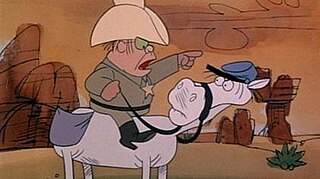
Hoot Kloot is an American series of 17 theatrical cartoon shorts produced by DePatie–Freleng Enterprises from 1973 to 1974.

The Dogfather is an American series of 17 cartoons produced by DePatie–Freleng Enterprises and distributed by United Artists between 1974 and 1976. It is the final theatrical cartoon series made by DePatie–Freleng.

The Inspector is an American series of 34 theatrical cartoon shorts produced between 1965 and 1969 by DePatie–Freleng Enterprises and released through United Artists. The cartoons are dedicated to an animated version of Inspector Clouseau comically battling against a rogues' gallery of internationally styled villains.
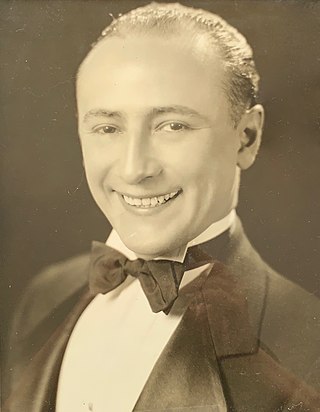
William "Bill" Benjamin Lava was a composer and arranger who composed and conducted music for feature films as well as that for the Warner Bros.' Looney Tunes and Merrie Melodies animated cartoons from 1962 to 1969, replacing the deceased Milt Franklyn, making him the last composer and arranger in the classic era of Warner Bros. Cartoons.

Misterjaw is a 34-episode cartoon television series, produced at DePatie-Freleng Enterprises in 1976 for The Pink Panther Laugh and a Half Hour and a Half Show television series on NBC. Reruns continued on the Think Pink Panther Show on NBC through September 3, 1978.

The Pink Panther is a fictional animated character who appears in the opening and/or closing credit sequences of every film in The Pink Panther series except for A Shot in the Dark and Inspector Clouseau. In the storyline of the original film, the "Pink Panther" is the name of a valuable pink diamond named for a flaw that shows a "figure of a springing panther" when held up to the light in a certain way; in the credits this was translated to an animated pink panther. Only the first Pink Panther film and its third sequel, The Return of the Pink Panther, featured the diamond.

The Pink Panther Show is a showcase of animated shorts produced by David H. DePatie and Friz Freleng between 1969 and 1978, starring the animated Pink Panther character from the opening credits of the live-action films. The series was produced by Mirisch Films and DePatie–Freleng Enterprises, and was broadcast Saturday mornings on two American television networks: from September 6, 1969, to September 2, 1978, on NBC; and from September 9, 1978, to September 1, 1979, on ABC.
Hawley B. Pratt was an American film director, animator, designer and illustrator. He is best known for his work for Warner Bros. Cartoons and as the right-hand man of director Friz Freleng as a layout artist and later as a director. Pratt also worked for Walt Disney Studios, Filmation, and DePatie-Freleng Enterprises where he co-created The Pink Panther.
Crazylegs Crane is a 16-episode made-for-television cartoon series produced by DePatie–Freleng Enterprises in 1978 for The All New Pink Panther Show on ABC.

The Pink Blueprint is the 18th cartoon produced in the Pink Panther series. A total of 124 6-minute cartoons were produced between 1964 and 1980.
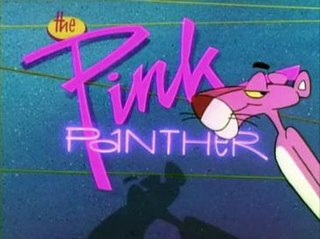
The Pink Panther is an American animated television series starring the Pink Panther and his co-stars from the original cartoon shorts in a series of brand new stories. The program was a production of Metro-Goldwyn-Mayer Animation. It was distributed by Claster Television and King World Productions and not MGM Television, despite MGM owning The Pink Panther. Unlike other animated series featuring the Pink Panther, this is the only series where he and the Little Man speak numerous lines. Prior to this series, the Panther had only briefly spoken in two cartoons in the 1960s.
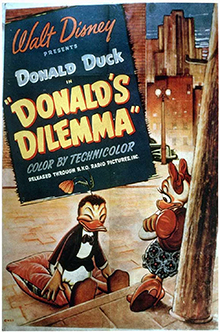
Donald's Dilemma is a Walt Disney Studios animated cartoon directed by Jack King and starring Donald and Daisy Duck. It was originally released on July 11, 1947 in the United States. The title of this short is somewhat of a misnomer. Although Donald is the official headliner for this cartoon, Daisy is the actual protagonist. The dilemma of the title is actually offered to her, not to Donald.

Popeye the Sailor is an American animated series of short films based on the Popeye comic strip character created by E. C. Segar. In 1933, Max and Dave Fleischer's Fleischer Studios, based in New York City, adapted Segar's characters into a series of theatrical cartoon shorts for Paramount Pictures. The plotlines in the animated cartoons tended to be simpler than those presented in the comic strips, and the characters slightly different. A villain, usually Bluto, makes a move on Popeye's "sweetie", Olive Oyl. The villain clobbers Popeye until he eats spinach, giving him superhuman strength. Thus empowered, Popeye makes short work of the villain.
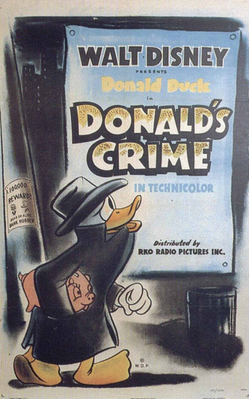
Donald's Crime is a 1945 American animated short film produced by Walt Disney Productions and released by RKO Radio Pictures. The cartoon, which parodies film noir crime dramas of the time, follows Donald Duck as he struggles with guilt after stealing $1.25 from his nephews. The film was directed by Jack King and features original music by Edward H. Plumb. The voice cast includes Clarence Nash as Donald, Huey, Dewey, and Louie, Ruth Clifford as Daisy Duck, and Harry E. Lang as the off-stage voice of Donald's conscience. This was Blondell's first performance as Daisy and marks the debut of the character's "normal" voice. Previously in Mr. Duck Steps Out, Daisy had been voiced by Nash using a voice similar to Donald's.
References
- 1 2 3 Beck, Jerry (2006). Pink Panther: The Ultimate Guide to the Coolest Cat in Town. New York, New York: Dorling Kindersley, Ltd. pp. 54–55, 102–103. ISBN 0-7566-1033-8.
- ↑ Lenburg, Jeff (1999). The Encyclopedia of Animated Cartoons. Checkmark Books. pp. 130–131. ISBN 0-8160-3831-7 . Retrieved 6 June 2020.